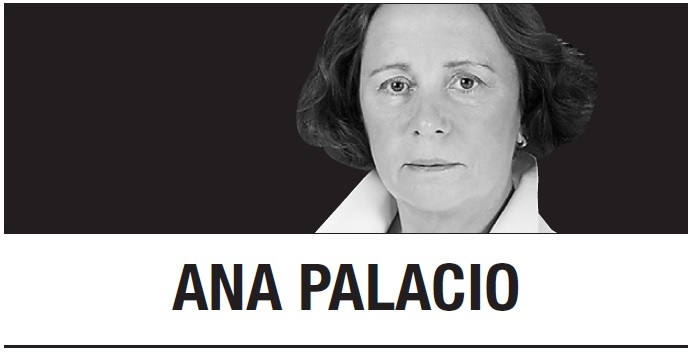[Ana Palacio] Europe’s latest strategic letdown for the Indo-Pacific
By Korea HeraldPublished : May 3, 2021 - 05:31

The world’s geostrategic focus on the Indo-Pacific region is a recent phenomenon. Just a few years ago, it was Asia -- or perhaps the Asia-Pacific region -- that consumed the world’s attention, with former US President Barack Obama’s “pivot to Asia” a case in point.
But the focus on Asia was fundamentally about China. And that country is hardly operating exclusively within Asia. Its “Belt and Road” initiative, for example, has far-reaching -- almost world-spanning -- ambitions. And its aggressive efforts to assert its maritime claims have terrified countries from Australia to the Philippines.
China has also been provoking India with encroachments on Indian territory in the Himalayas, occasionally leading to deadly military clashes and suggesting an approach to territorial expansion there that increasingly resembles its maritime strategy. In response, India has toughened its stance toward China, while deepening its engagement with the “Quad” of Australia, India, Japan and the United States.
The Quad’s members have a common interest in keeping the Indo-Pacific -- with its critical shipping lanes and seabed cable infrastructure -- “free and open.” Europe shares that interest. And yet, while the Quad emerged in 2017, France developed something akin to a formal Indo-Pacific strategy only in 2018. And its European partners -- beginning with Germany and the Netherlands -- did not follow suit until last year.
As for the United Kingdom, its Indo-Pacific strategy is incorporated into the recently published Integrated Review of Security, Defense, Development and Foreign Policy, which establishes that the Indo-Pacific -- the only geographical area with its own section -- has important implications for the UK’s economy, national security and global ambitions. The review makes clear that the UK must forge partnerships in the region that will advance its interest on all these fronts.
This approach contrasts sharply with the EU guidance. Yes, the EU strategy demonstrates the EU’s recognition of the Indo-Pacific’s “growing importance.” But whereas the UK is defending national interests that may or may not overlap with global priorities, the EU is emphasizing general objectives, with which it hopes regional partners will be able to agree.
In fact, the phrase “EU interests” receives only three rather generic mentions in the text. What the EU offers instead of clear policy priorities is a vague pledge to “reinforce its role as a cooperative partner in the Indo-Pacific” with its regional partners in a broad range of areas, from climate change to the pandemic recovery to gender equality.
With this approach, the EU hopes to contribute to “the stability, security, prosperity, and sustainable development of the region.” In other words, in true Brussels style, the EU’s new Indo-Pacific strategy emphasizes soft power, while lumping together bilateral and multilateral efforts in unclear and potentially overlapping ways.
The text does not identify any geographical priorities, either. Apparently, the EU was unable to reconcile member states’ conflicting visions. The result is that it has essentially indicated that its interests are the same across the area from the “east coast of Africa to the Pacific Island States.”
But, of course, there is an elephant -- or, rather, a dragon -- in the room. Anything but skittish, the UK takes a clear-eyed view of the threats posed by China’s brand of authoritarianism, though it also stands ready to trade -- and engage more broadly -- with the country. The EU, by contrast, mentions China only in its list of bilateral agreements. It is a classic case of European fence-sitting.
Likewise, in the strategy’s sole paragraph dedicated to security, the EU waves its hands: “Member States acknowledge the importance of a meaningful European naval presence in the Indo-Pacific.” These nebulously defined ambitions stand in stinging contrast to the UK’s clear naval objectives.
The EU’s only well-defined objective is to expand CRIMARIO -- the French-led information-exchange and crisis-management program for crucial maritime routes -- from the Indian Ocean to South Asia, Southeast Asia and the South Pacific. It’s a positive step, but not enough.
EU leaders might counter the argument that they lack a clear and credible strategy for the Indo-Pacific by noting that they are emphasizing principles over actors. But, while this approach is laudable, and may even keep the Strategy for Cooperation relevant for a longer time, it cannot come at the expense of substance. And what the EU has produced is a document full of bureaucratic jargon that leaves one wondering not only about Europe’s specific priorities, but also whether it is truly committed to establishing a presence in the region.
But all hope is not lost. The new strategy is a first step, and in the EU, first steps often require the greatest effort, even if they don’t get us far. Now, it is up to the European Commission and the High Representative, tasked by the Council to present a communication before September, to provide the clarity Europe’s Indo-Pacific strategy needs.
Ana Palacio
Ana Palacio, a former minister of foreign affairs of Spain and former senior vice president and general counsel of the World Bank Group, is a visiting lecturer at Georgetown University. -- Ed.
(Project Syndicate)
-
Articles by Korea Herald






![[From the Scene] Monks, Buddhists hail return of remains of Buddhas](http://res.heraldm.com/phpwas/restmb_idxmake.php?idx=644&simg=/content/image/2024/04/19/20240419050617_0.jpg&u=20240419175937)




![[Graphic News] French bulldog most popular breed in US, Maltese most popular in Korea](http://res.heraldm.com/phpwas/restmb_idxmake.php?idx=644&simg=/content/image/2024/04/18/20240418050864_0.gif&u=)




![[From the Scene] Monks, Buddhists hail return of remains of Buddhas](http://res.heraldm.com/phpwas/restmb_idxmake.php?idx=652&simg=/content/image/2024/04/19/20240419050617_0.jpg&u=20240419175937)

![[KH Explains] Hyundai's full hybrid edge to pay off amid slow transition to pure EVs](http://res.heraldm.com/phpwas/restmb_idxmake.php?idx=652&simg=/content/image/2024/04/18/20240418050645_0.jpg&u=20240419100350)

![[Today’s K-pop] Illit drops debut single remix](http://res.heraldm.com/phpwas/restmb_idxmake.php?idx=642&simg=/content/image/2024/04/19/20240419050612_0.jpg&u=)